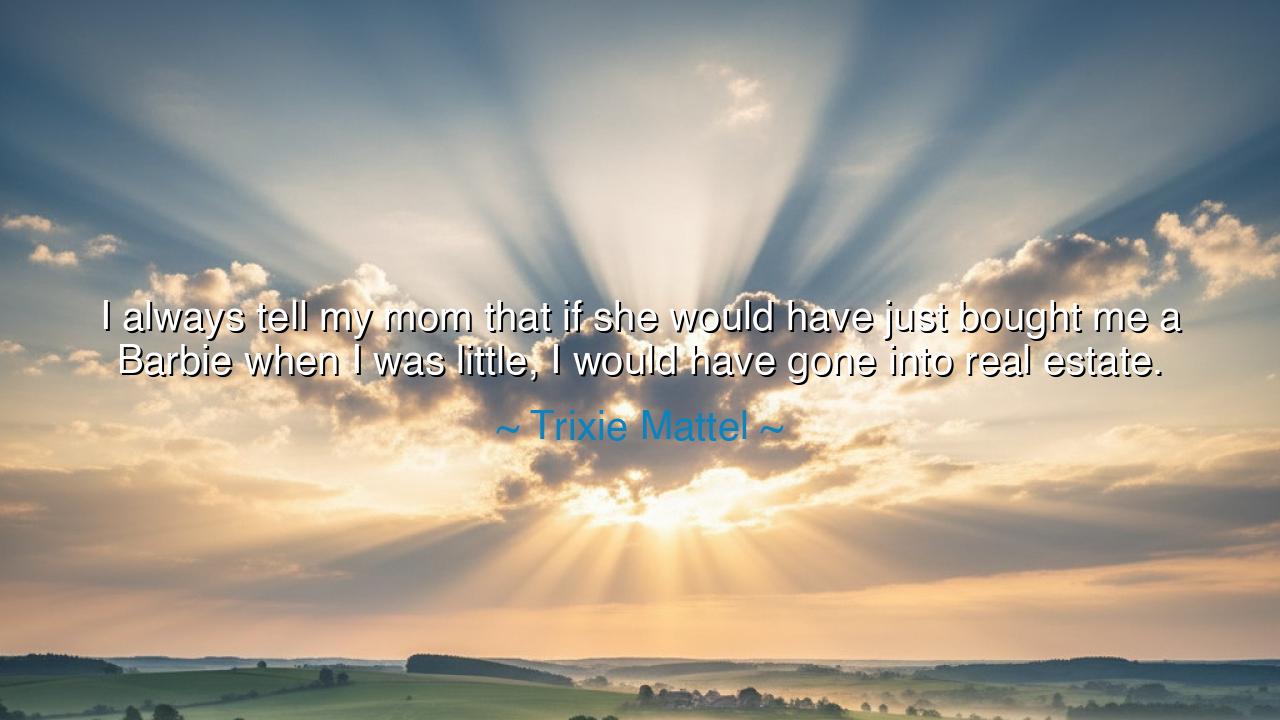
I always tell my mom that if she would have just bought me a
I always tell my mom that if she would have just bought me a Barbie when I was little, I would have gone into real estate.






In the whimsical yet profound words of Trixie Mattel, “I always tell my mom that if she would have just bought me a Barbie when I was little, I would have gone into real estate.” At first, the saying rings with humor—a jest carried on the wings of laughter. Yet beneath its shimmering wit lies a deeper truth about identity, creativity, and destiny. The doll, that small figure of imagination, becomes a symbol of self-expression denied and rediscovered. In that single line, there is both sorrow and triumph, the tale of a spirit that refused to wither even when the world misunderstood its song.
Long ago, the wise understood that to suppress the child’s nature is to silence the divine within them. For every child is born carrying the seed of a unique calling, a sacred inclination toward beauty, art, or truth. When Trixie speaks of the Barbie, she speaks not of plastic or play, but of a portal—a symbol of imagination unbound. To be denied it is not mere deprivation of a toy, but of a language through which the young heart might have learned to see itself reflected. Yet from that denial rose something magnificent: a performer who transformed pain into artistry, limitation into laughter, and alienation into power.
The ancients told the story of Pygmalion, the sculptor who fell in love with his own creation. His yearning gave life to stone, and the goddess Aphrodite, moved by his devotion, breathed soul into marble. So too did Trixie Mattel breathe life into her own creation—the glamorous, exaggerated self that the world once forbade her to be. The Barbie became not a toy, but a destiny reclaimed. Her art became her act of rebellion, her mirror to the divine feminine within, her proof that what is denied can still be reborn through will and imagination. In this, there is the sacred truth: the soul will always find a way to express itself, even if it must carve its own wings.
There is humor in Trixie’s voice, yes, but it is the laughter of one who has conquered sorrow. The jest hides wisdom. “If she had bought me that doll,” she says, “I would have gone into real estate.” This is not merely about careers or fortunes; it is a parable. The “real estate” she speaks of is symbolic—it is the world of practical expectations, of conformity, of fitting neatly into society’s architecture. Instead, deprived of that toy, she turned toward art, toward performance, toward creation. The denial pushed her into invention. Thus, what was withheld became the very fire that forged her genius. Such is the paradox of destiny: what the world withholds from us may become the hammer that shapes our purpose.
Consider the story of Frida Kahlo, the painter of pain and color. Bound to her bed by injury, she could not run in the fields of her youth, so she painted her soul upon the canvas instead. What she lacked in movement, she gained in vision. Her suffering became her art, her confinement her liberation. Just as Trixie Mattel turned the absence of Barbie into the birth of a dazzling persona, Frida turned physical constraint into an infinite landscape of imagination. From both, we learn that what is denied may yet be transformed into power when the heart refuses to bow.
The lesson, dear listener, is that we must not curse our early limitations, nor the gates that once seemed closed to us. For within every denial lies the spark of redirection. If the world will not give you a Barbie, carve your own out of dreams. If they mock your light, turn that mockery into a crown. The gods of old often disguised their blessings as trials, to test whether the human spirit would rise or crumble. Those who rise become legends—not because the path was smooth, but because they forged beauty from refusal.
And so, pass this teaching to your children and your children’s children: nurture what they love, for in their play lies the whisper of their calling. Yet even if the world denies them their Barbie, their music, their canvas, teach them to craft their own. For the spirit that is meant to create will find a way, whether through song, paint, performance, or the fierce joy of being oneself. Let no heart be ashamed of what it loves.
Thus speaks the wisdom of Trixie Mattel—not in jest, but in triumph. Her words remind us that the soul’s journey is not hindered by what it lacks, but strengthened by what it must imagine into being. So take heart, O dreamer. Laugh at your sorrows, paint your wounds with glitter, and turn your past denials into the stage upon which you stand. For life’s truest art is not made from having all things—but from transforming loss into light.






AAdministratorAdministrator
Welcome, honored guests. Please leave a comment, we will respond soon